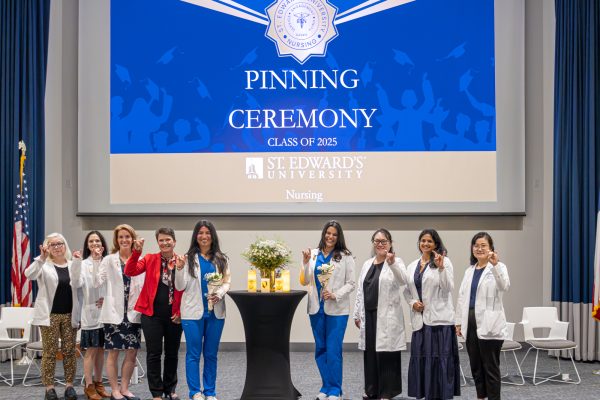Workshop prepares interns for summer
Unemployment is still a problem nationwide, but the Career Planning office at St. Edward’s University is already at work to try and help students find internships for the summer.
Andrew Harper, internship coordinator for the Career Planning department, led a Jan. 25 summer internship workshop, which was designed to introduce students to the internship application process and help them begin their internship search.
“More and more employers are emphasizing that students must have internships to be considered for employment,” Harper said. “It is going to be much easier for a student to get their foot in the door by trying to get an internship than trying to get a job.”
The workshop is part of a series of career planning events and information sessions about jobs and internships leading up to the Career Planning center’s annual Job and Internship Fair.
The fair, which will take place on March 24, brings about 100 employers to St. Edward’s every year to network with students and inform them about both part-time internships and full-time employment opportunities.
The Career Planning center also hosts a smaller fair, exclusively for internships, every fall. Last year about 40 employers were represented at the Internship Fair.
“We’re going to continue to put a lot of effort into fostering that culture by bringing organizations to campus that can offer internship opportunities and by making sure we have a lot of internship sites in our database,” Harper said.
Harper held the summer internship workshop weeks before the spring Job and Internship Fair because of the early deadlines for many summer internships.
“If you’re looking for a structured internship program, particularly one that might pay, those deadlines are going to be occurring between now and the end of March,” Harper said.
The Career Planning center will hold internship information sessions throughout February with representatives from small businesses, non-profit organizations and government agencies. Many of the internships are targeted at the large community of liberal arts and business students at St. Edward’s who can fill a growing need for marketing and communications interns.
“There are a lot of jobs in marketing and communications right now,” Harper said. “A lot of internships are concentrated on writing, graphic design [and] video production. We don’t have a lot of tech employers coming to St. Edward’s because our computer science population isn’t as big as our communications. But this is Austin, so there are going to be a lot of high-tech job opportunities too.”
Unlike larger businesses or government agencies, many of the small or medium-sized businesses based in Austin offer internships that do not involve a formal application process.
“Sometimes it’s just simply picking up the phone and calling an organization,” Harper said. “In some places, the process is very cut-and-dry; other places, you have to take a more proactive approach.”
Harper recently pre-screened applications from St. Edward’s students for the HEB Community Internship Program, which helps provide non-profit organizations with funds to support paid interns. The work allowed him to experience the hiring process from an employer’s perspective.
“Many resumes are just poorly formatted and not well-written,” Harper said. “The objective statement is missing or just doesn’t apply to the internship; they don’t make the case on how they can connect to the internship. Students don’t realize that they need a really good resume.”
Another common mistake students make when applying for internships is neglecting to research the companies for which they want to work.
“Most students don’t get internships because in interviews, they’re asked, ‘What do you know about our company?’ and they say ‘I don’t know anything,'” Harper said. “That usually means the interview is pretty much over.”
Harper said it is important for students to emphasize why they are a good match for the internship and what they can bring to the company or organization.
“How are you going to make them productive? It’s not the other way around,” Harper said.






